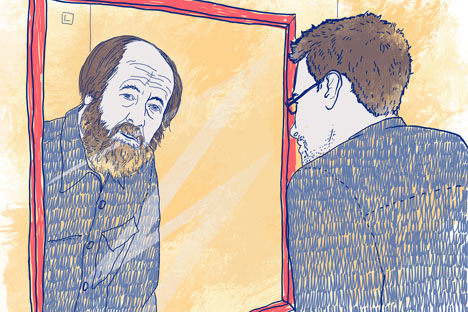
Click to enlarge the image. Drawing by Natalia Mikhaylenko
There are many interesting similarities between Edward Snowden and the famous Russian dissident writer Alexander Solzhenitsyn (1918-2008). The most recent example of these is the interview Snowden recently gave to the New York Times explaining his actions and denying rumors that he had passed U.S. secrets to Russian and Chinese spies.
This interview came too late. It took place several months after the peak of the Snowden hysteria. In the same way, Solzhenitsyn’s return to Russia in 1994, 20 years after his exile from the Soviet Union in 1974, was viewed by many as a belated one – it should have taken place in 1989-1991 as the Soviet state was collapsing.
In the interview, Snowden explained that he did not consider his action anti-American and that he did not carry any sensitive documents after releasing the information on the NSA’s surveillance programs to journalists in Hong Kong.
He also defended himself against the accusations of working for Chinese or Russian intelligence, stating that he had carefully protected sensitive data from the Chinese intelligence officers because he had studied Chinese intelligence intensively and was well aware of its capabilities. Snowden added in the interview that the NSA knew he had not revealed any secrets to the Chinese.
For Snowden’s reputation, these explanations also came too late – which brings another comparison to Solzhenitsyn. For several months during the spring and summer, U.S. officials mounted an aggressive campaign against Snowden, calling him a traitor and hinting at possible material interests he might be pursuing by making his revelations in Hong Kong and Russia.
Solzhenitsyn was also very careless in terms of personal PR: instead of protecting himself against the accusations of treason mounted against him by the Soviet authorities, he always talked about the global problems of Russia and the world in general, never revealing details of his personal life or otherwise catering to the public’s curiosity.
The disparity between Solzhenitsyn and Snowden is in form, not in substance. In the 1950s and 1960s, when Solzhenitsyn wrote his best books, people still read epistolary novels, with letters written by an author of fiction.
Southwark Playhouse stages Solzhenitsyn’s Gulag love story
In Snowden’s time, people prefer the real thing – genuine E-mail messages leaked into the Internet. But the authorities in both cases reacted the same way. Both the Soviet authorities in Solzhenitsyn’s 1970s and the American authorities in 2013 did not deny that the revelations were true.
The authorities just said that the two authors were presenting atypical phenomena. Leonid Brezhnev could not deny the existence of the Gulag, but he said that they were “deviations from the way of Socialist law” and “individual mistakes.”
In the same way, the NSA’s defenders in the U.S. said that the PRISM program was targeting terrorists. They added that it was unfortunate if some ordinary citizens were sometimes eavesdropped on, but this was not the standard practice - even if the “individual mistakes” could be counted in millions, just like in Solzhenitsyn’s revelation about the whole “archipelago” of labor camps.
Both Solzhenitsyn and Snowden were criticized by some of their compatriots for revealing their findings to foreigners and not to their own domestic bureaucrats. And the people who helped Solzhenitsyn transfer the manuscripts of his novels abroad had problems with the KGB just as the American and British authorities have put pressure on the journalists who helped Snowden reveal his secrets.
In both cases, the truth seekers found some support and understanding abroad. But here the similarities of the stories end. Brezhnev could have sent Solzhenitsyn to the Gulag– the system of camps was still functioning in 1970s, even if on a smaller scale – but the Soviet premier preferred to avoid a trial, which would have been a public relations disaster for the Soviet Union.
Instead, Solzhenitsyn was sent to West Germany. Snowden, however, was already in exile when he made his revelations. U.S. President Barack Obama has since attempted to bring him back to the U.S. to stand trial. In the case of Snowden, the saying is true that history repeats itself not as tragedy, but as a particularly Orwellian type of farce.
Dmitry Babich is a columnist for Voice of Russia radio.
All rights reserved by Rossiyskaya Gazeta.
Subscribe
to our newsletter!
Get the week's best stories straight to your inbox